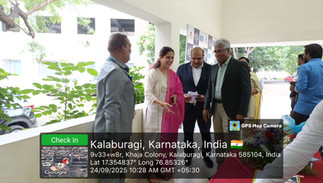Two-Day Workshop on Institutional Development Plan Concludes at KBN University
- Oct 4, 2025
- 4 min read
A two-day workshop on the Institutional Development Plan (IDP), organised by the Internal Quality Assurance Cell (IQAC) of Khaja Bandanawaz University (KBNU) in collaboration with Institute of Academic Excellence, Hyderabad concluded on Thursday, leaving behind a rich exchange of ideas and strategies for institutional growth. The workshop held on September 24–25, 2025, at Lecture Hall-3 of the Department of Forensic Medicine, Faculty of Medical Sciences (FoMS), KBNU. The workshop brought together two prominent resource personsaiming to explore systematic ways to elevate the university towards becoming a Centre of excellence in higher education.
Inaugural Session: Setting the Tone for Development
The inaugural session opened with the recitation of verses from the Holy Quran, seeking divine blessings for the success of the workshop. Dr. Abdul Baseer, Director, IQAC, KBNU, formally welcomed the resource persons, guests, and participants. He underlined the significance of such workshops in shaping a roadmap for improvement of any institute.
Following the welcome, dignitaries and resource persons were felicitated by the university. Pro Vice Chancellor, Prof. Syed Ashfaq, in his inaugural address, set the tone for the workshop by elaborating on the objectives of Institutional Development Plans. He reminded participants of the importance of well-structured developmental strategies in positioning KBNU as a leading institution. “An IDP is not merely a document; it is the soul of an institution’s vision and mission,” he remarked, stressing that strategic planning and timely implementation could transform KBNU into a hub of academic and research excellence.
Day One
The first technical session was delivered by Mr. K. Venkatesh, Director, IAE, Hyderabad, on the topic “Overview and Significance of IDP.” anchored by Dr. Syed Abrar, Assistant Professor, Department of Botany, the session began with a contextual introduction to KBNU’s vision and mission. Mr. Venkatesh presented a “vision document model” and explained the importance of aligning institutional goals with national and global expectations. He provided participants with an overview of AISHE (All India Survey on Higher Education), highlighting its role in benchmarking universities. He further shed light on the transformation of higher education institutions for global positioning, pointing out that universities must adapt to the expectations of stakeholders including students, faculty, industry, and society.
The second session featured Dr. A. M. Rawani, Former Director, NIT, Raipur, Advisor in Accreditation and Ranking for Higher Education, who spoke on the “Enablers of IDP.” His session focused on governance enablers, academic enablers, and particularly, research enablers. Drawing on his extensive experience, Dr. Rawani explained how robust governance structures and a culture of research can serve as cornerstones for long-term institutional development.
Post-lunch, the workshop resumed with Dr. Rawani continuing his deliberation on physical enablers, where he detailed infrastructural and resource-based requirements for a sustainable development plan. His inputs were well-received, with participants appreciating the practical clarity of his insights.The day concluded with another engaging session by Mr. Venkatesh on “Perspective Plans for Universities.” He laid out the methodology for achieving international rankings and explained the parameters for excelling under NIRF, QS, and THE University Rankings. His emphasis on strategic branding and institutional benchmarking left participants with actionable ideas for enhancing KBNU’s global reputation.
Day Two
The second day began with a comprehensive session by Prof. A. M. Rawani, former Director of NIT Raipur, on “Institutional Development Plan and Its Effective Implementation.” Using real-life examples, Prof. Rawani explained the key factors of IDP such as need-based planning, goal-oriented objectives, and multi-layered strategies.He distinguished between short-term, mid-term, and long-term plans, guiding the participants on how to balance ambition with feasibility. Prof. Rawani outlined four critical steps in IDP preparation:
Identifying strategic goals
Breaking goals into measurable and time-bound plans
Identifying the execution paths
Reviewing and evaluating progress
His session was enriched with practical flow-charts, making complex processes easy to comprehend. He also highlighted tools and indicators for assessing IDP implementation, while mentioning the key challenges such as inadequate resources, resistance to change, and lack of periodic review.
Following a short break, the spotlight returned to Mr. Venkatesh, who conducted a session on “Establishing an IDP Cell.” He emphasised that having a dedicated IDP cell within the university is essential to ensure consistent monitoring, evaluation, and upgradation of institutional strategies. He discussed parameters for prioritisation and offered guidance on capacity-building within such a cell. The engagement of the participants through interaction and brainstorming workshop provided an opportunity to gain practical insights into institutional planning and ranking mechanisms. The workshop signified a step forward in aligning itself with national educational priorities and global academic benchmarks.
Valedictory Session
The two-day workshop concluded with a solemn valedictory session, beginning once again with the recitation of the Quran. Hon'ble Vice Chancellor Prof. Ali Raza Moosvi felicitated the resource persons, acknowledging their contribution to the academic enrichment of KBNU. While addressing the participants, Prof Moosvi stressed on more participation from the faculty and advised the participants to come up with new idea to speed up the growth and development of Khaja Bandanawaz University.
Delivering the vote of thanks, Dr. Zama Moosvi commended the vision of the Hon'ble Founder Chancellor and the efforts of the Hon'ble Chancellor, KBNU in continuing the legacy of his fore fathers in "Educating Humanity", and relentless efforts of the Hon'ble Vice Chancellor, Hon'ble Pro Vice Chancellor, and IQAC Director in fostering a culture of continuous development. She noted that the workshop was not just a knowledge-sharing exercise but a milestone in KBNU’s journey towards excellence and it would be incomplete without the role of the staff and students.
The session was anchored by Dr. Sameena Sindagiker, head, Department of Sociology.























































































Comments